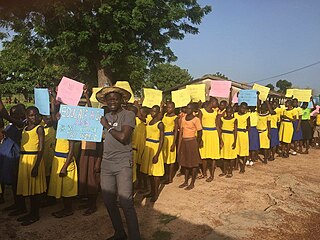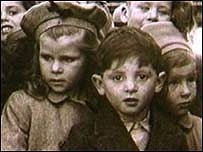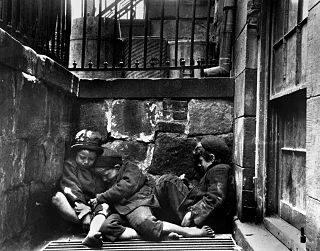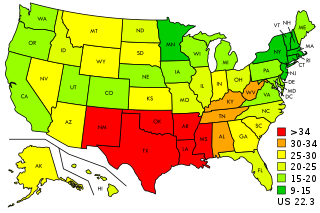
Universal access to education is the ability of all people to have equal opportunity in education, regardless of their social class, race, gender, sexuality, ethnic background or physical and mental disabilities. The term is used both in college admission for the middle and lower classes, and in assistive technology for the disabled. Some critics feel that this practice in higher education, as opposed to a strict meritocracy, causes lower academic standards. In order to facilitate the access of education to all, countries have right to education.

Foster care is a system in which a minor has been placed into a ward, group home, or private home of a state-certified caregiver, referred to as a "foster parent", or with a family member approved by the state. The placement of a "foster child" is normally arranged through the government or a social service agency. The institution, group home, or foster parent is compensated for expenses unless with a family member.
Voluntary childlessness, childfreeness, or being childfree, describes the voluntary choice not to have children.
The Annie E. Casey Foundation (AECF) is a charitable foundation focused on improving the well-being of American children and youth.
Maximus Inc. is an American government services company, with global operations in countries including the United States, Australia, Canada, and the United Kingdom. The company contracts with government agencies to provide services to manage and administer government-sponsored programs. Maximus provides administration and other services for Medicaid, Medicare, health care reform, welfare-to-work, and student loan servicing among other government programs. The company is based in Tysons, Virginia, has 34,300 employees and a reported annual revenue of $3.46 billion in fiscal year 2020.

A helicopter parent is a term for a parent who is overattentive and overly fearful of a child's experiences and problems, particularly outside the home and at educational institutions. Helicopter parents are so named because, like helicopters, they "hover overhead", overseeing every aspect of their child's life. A helicopter parent is also known to strictly supervise their children in all aspects of their lives, including in social interactions.
Child protective services (CPS) is the name of an agency in many states of the United States responsible for providing child protection, which includes responding to reports of child abuse or neglect. Some states use other names, often attempting to reflect more family-centered practices, such as department of children and family services (DCFS). CPS is also sometimes known by the name of department of social services, though these terms more often have a broader meaning.

Safeguarding is a term used in the United Kingdom, Ireland and Australia to denote measures to protect the health, well-being and human rights of individuals, which allow people—especially children, young people and vulnerable adults—to live free from abuse, harm and neglect.
After-school activities, also known as after-school programs or after-school care, started in the early 1900s mainly just as supervision of students after the final school bell. Today, after-school programs do much more. There is a focus on helping students with school work but can be beneficial to students in other ways. An after-school program, today, will not limit its focus on academics but with a holistic sense of helping the student population. An after-school activity is any organized program that youth or adult learner voluntary can participate in outside of the traditional school day. Some programs are run by a primary or secondary school, while others are run by externally funded non-profit or commercial organizations. After-school youth programs can occur inside a school building or elsewhere in the community, for instance at a community center, church, library, or park. After-school activities are a cornerstone of concerted cultivation, which is a style of parenting that emphasizes children gaining leadership experience and social skills through participating in organized activities. Such children are believed by proponents to be more successful in later life, while others consider too many activities to indicate overparenting. While some research has shown that structured after-school programs can lead to better test scores, improved homework completion, and higher grades, further research has questioned the effectiveness of after-school programs at improving youth outcomes such as externalizing behavior and school attendance. Additionally, certain activities or programs have made strides in closing the achievement gap, or the gap in academic performance between white students and students of color as measured by standardized tests. Though the existence of after-school activities is relatively universal, different countries implement after-school activities differently, causing after-school activities to vary on a global scale.
UNICEF, originally called the United Nations International Children's Emergency Fund in full, now officially United Nations Children's Fund, is an agency of the United Nations responsible for providing humanitarian and developmental aid to children worldwide. The organization is one of the most widely known and visible social welfare entities globally, operating in 192 countries and territories. UNICEF's activities include providing immunizations and disease prevention, administering treatment for children and mothers with HIV, enhancing childhood and maternal nutrition, improving sanitation, promoting education, and providing emergency relief in response to disasters.
Educational inequality is the unequal distribution of academic resources, including but not limited to school funding, qualified and experienced teachers, books, and technologies, to socially excluded communities. These communities tend to be historically disadvantaged and oppressed. Individuals belonging to these marginalized groups are often denied access to schools with adequate resources. Inequality leads to major differences in the educational success or efficiency of these individuals and ultimately suppresses social and economic mobility. Inequality in education is broken down into different types: regional inequality, inequality by sex, inequality by social stratification, inequality by parental income, inequality by parent occupation, and many more.
LENA is a developer of advanced technology and programs to accelerate language development of children 0–3 and to close opportunity gaps.

Common Sense Media (CSM) is an American nonprofit organization that reviews and provides ratings for media and technology with the goal of providing information on their suitability for children. It also funds research on the role of media in the lives of children and advocates publicly for child-friendly policies and laws regarding media.
The racial achievement gap in the United States refers to disparities in educational achievement between differing ethnic/racial groups. It manifests itself in a variety of ways: African-American and Hispanic students are more likely to earn lower grades, score lower on standardized tests, drop out of high school, and they are less likely to enter and complete college than whites, while whites score lower than Asian Americans.

Foster care is the term used for a system in which a minor who has been made a ward is placed in an institution, group home, relative placement, or private home of a state certified caregiver. The placement of the child is usually arranged through the government or a social-service agency. The institution, group home, or foster parent is paid. The state via the family court and child protection agency stand in loco parentis to the minor, making all legal decisions, while the foster parent is responsible for the day-to-day care of the minor. The foster parent is remunerated by the state for their services.

Teenage pregnancy in the United States occurs mostly unintentionally and out of wedlock but has been declining almost continuously since the 1990s. In 2022, it fell to 13.5 per 1,000 girls aged 15 to 19, the lowest on record. According to the Centers for Disease Control and Prevention (CDC), this decline is due to abstinence and the use of contraception. However, the averages conceal significant ethnic or geographic differences within the nation. The birth rates for Hispanic and African-American teens were more than double those of European-American teens, while Asian-American adolescents have the lowest pregnancy and birth rates of all. As of 2015, New Mexico, Texas, Oklahoma, Arkansas, Louisiana, and Mississippi had the highest adolescent birth rates in the Union.
Free-range parenting is the concept of raising children in the spirit of encouraging them to function independently and with limited parental supervision, in accordance with their age of development and with a reasonable acceptance of realistic personal risks. It is seen as the opposite of helicopter parenting. A notable text of the movement is Lenore Skenazy's book Free-Range Kids: Giving Our Children the Freedom We Had Without Going Nuts with Worry (2009).

The New York City Administration for Children's Services (ACS) is a New York City government agency that protects and promotes safety and the well-being of New York City's children and families by providing child welfare, juvenile justice, and early care and education services.
Chapin Hall at the University of Chicago is a policy research institution at the University of Chicago that focuses on child welfare and family well-being. Chapin Hall is funded through social service systems, foundations, and non-profit organizations. The organization's focus areas include child welfare and foster care systems, youth homelessness, and community capacity to support children, youth, and families. Chapin Hall is an affiliated research center of the University of Chicago.
BCFS Health and Human Services is a U.S. 501(c)(3) organization based in San Antonio, Texas, specializing in emergency shelter, foster care, and adoption. It was founded as an orphanage for Hispanic children in 1944.








